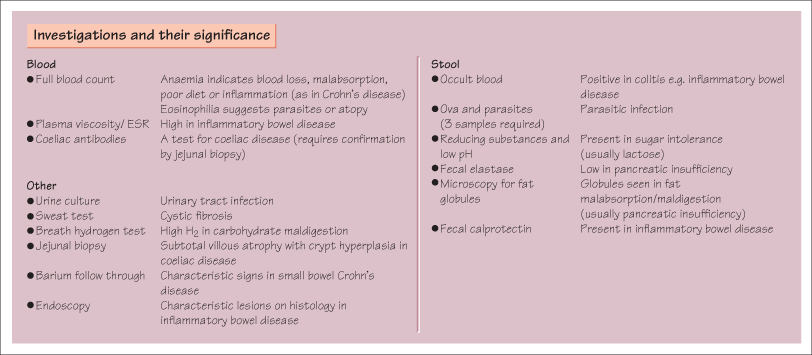
Toddler Diarrhoea
Toddlers often experience non-specific diarrhoea, probably due to a rapid gastrocolic reflex. Features are drinking excessive fluids, particularly fruit juices, and food particles in the stool. The diagnosis should only be made if the child is thriving. Reassurance is all that is required.
Lactose Intolerance
Lactose intolerance is common in babies and young children following gastroenteritis. The superficial mucosal cells containing lactase are stripped off, causing high levels of lactose in the bowel, which prolongs the diarrhoea. Congenital lactose intolerance is rare. Lactose intolerance should be suspected if diarrhoea persists for weeks after a gastroenteritis illness. It is rarely necessary to perform lactose challenge or hydrogen breath tests. In bottle-fed babies an empirical change of formula to soy milk (which contains non-lactose sugar) can be tried. The baby should revert to cow’s milk once symptoms resolve. Breast-fed babies should continue breastfeeding.
Coeliac Disease
Coeliac disease results from intolerance to gluten, a substance found in wheat, rye and barley. Children usually present before 2 years of age with failure to thrive, irritability, anorexia, vomiting and diarrhoea. Signs include abdominal distension, wasted buttocks, irritability and pallor. The stools are pale and foul-smelling.
Investigations show iron deficiency anaemia and steatorrhoea. Coeliac antibodies (IgA anti-tissue transglutaminase or anti-endomysial antibodies) are present in blood, but a definitive diagnosis is made by finding subtotal villous atrophy on jejunal biopsy. Treatment is a gluten-free diet, eliminating all wheat and rye products. Improved mood, resolution of diarrhoea and good growth occur promptly. The diet is quite restrictive and must be continued indefinitely. Rechallenge with gluten after 2 years (to allow for full regeneration of the villi) and repeat biopsy are recommended. Coeliac disease is common—about 1 in 100 adults. It is associated with diabetes and Down’s syndrome.
Inflammatory Bowel Disease
Inflammatory bowel disease (IBD) is a cause of chronic diarrhoea in late childhood and adolescence. Both Crohn’s disease and ulcerative colitis are characterized by unpredictable exacerbations and remissions.
- Crohn’s disease presents with recurrent abdominal pain, anorexia, growth failure, fever, diarrhoea, anaemia, oral and perianal ulcers and arthritis. Diagnosis is by endoscopic biopsy. Remission can be induced by an elemental diet, immunomodulator drugs, anti-TNF-alpha agents (infliximab) or steroids. Surgical resection may be indicated for localized disease.
- Ulcerative colitis presents with bloody diarrhoea and abdominal pain. Weight loss, arthritis and liver disturbance may also occur. Treatment is with oral or rectal mesalazine or steroid enemas. Immunosuppressive therapy, infliximab or even colectomy may be required in severe cases.
Parasites
Giardia lamblia can cause outbreaks of diarrhoea in daycare nurseries or may follow travel abroad. The child may be asymptomatic or have diarrhoea, weight loss and abdominal pain. Diagnosis is made on microscopic examination of the stool. Three separate specimens are required as excretion of the cysts can be irregular. Blood count may show eosinophilia. Treatment is with metronidazole.
Cow’s Milk Protein Intolerance
Allergy to cow’s milk protein is rare and often over-diagnosed. The diarrhoea may be bloody, and urticaria, stridor, wheeze and very rarely Anaphylaxis can occur. It is less common in babies who have been breast-fed. Diagnosis is clinical, and symptoms should subside within a week of withdrawing cow’s milk. The child should be rechallenged after a period of time (in hospital if original symptoms were severe). A hydrolysed protein formula milk should be used. In most cases intolerance resolves in 1–2 years.
< div class='tao-gold-member'>



